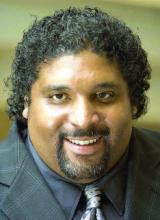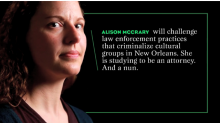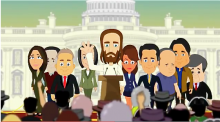Social Justice
On Friday, The New York Times reported:
"Moshe Silman, the desperately indebted Haifa man who set himself aflame last weekend as part of a social justice protest in Tel Aviv, died Friday from the second- and third-degree burns over 94 percent of his body.
In the year since 400,000 people filled Tel Aviv’s Rothschild Boulevard last summer, setting off a national protest movement, Mr. Silman, 57, had become a fixture of demonstrations in Haifa. His self-immolation stunned but also galvanized the protest movement, which had been struggling to find its footing."
Learn more here

It’s July 5 and we’ve got a little gift for you all.
The Sojourners office is only occupied today by a motley crew of staff who fall into two categories: those who were smart enough to not end up with any medical emergencies due to improper use of home fireworks, and those of us who weren’t smart enough to use the July 4th holiday as an opportunity for a five-day weekend. But, with this small, slightly dim group with highly refined survival instincts, we are still ready to bring you some great content.
We work hard every day to make sure our God's Politics blog brings you news and commentary on issues important to Christians who care about social justice. Still, it always seems like there is way more going on all day, every day than one person can ever keep up with.
For all of you who are unlucky enough to be chained to a computer, Blackberry (does anyone still use these?) smart-phone or are otherwise more electronically connected then you would like to be—we’ve got a special treat: our newest blog, “Quick Read: Social. Justice. News."
“TAMARA” GREW UP in an affluent, middle-to-upper-class neighborhood. Her friends, including the ones she knew from church, were her cousins, neighbors, and other kids who were a lot like her. Her parents worked hard at building a “safe zone” to protect her from harm—but, as Tamara looks back on her childhood, she can see the lasting fear that it instilled in her.
After she got her driver’s license, she always double-checked that her car doors were locked as soon as she was in the vehicle, and she avoided her city’s small downtown area. To this day, she detests large cities and is constantly worried that someone will rob her. Tamara suffers from “mean world” syndrome: a hyper-vigilant state in which strangers are to be ignored and avoided, new experiences are to be feared, and other people’s problems are just that. It’s a survival mode based on scarcity, hoarding, looking out for number one. Too often, it involves shrinking back from active involvement in the biblical call to social justice.
Sadly, many parents put children in a kind of quarantine—not seeking justice, but fearing contamination. The view that children are pure and the world is corrupt has led well-intentioned adults to (over)protect children from poverty, disease, violence, and other “pollutants.” (Of course, this isn’t to say that all children grow up sheltered; many experience situations of poverty, violence, and oppression that sheltered families can’t even imagine.) Ironically, as children are quarantined from the harmful realities of the world, they’re often exposed to virtual violence through television, music, and video games. This is a recipe for creating kids who, like Tamara, are afraid of the unknown that exists beyond their bubble-wrapped microcosms.
How do you get your kid to care about social justice? Well, you can bring her to marches and protests on important issues before she’s old enough to walk; croon her to sleep with freedom songs; or fill her Christmas stocking with fair-trade goodies.
My parents did all that when I was little. Some of my earliest memories involve talking to homeless people in my neighborhood, attending demonstrations with my church, door-to-door lobbying with my mom, even dressing up as Winnie the Pooh on a couple occasions to raise awareness about corporate child labor practices. But these events were just the side effects of having activist Christian parents; they say little about our family life and my own formation as a young person.
Perhaps one of the keys to social justice parenting is to ignore the question above. You can’t get your kid to care about social justice issues. Much like you can’t force your child to be a Christian, to dress a certain way, or to listen to certain music, you can’t set out with a goal to shape your child’s passions and interests. Parents who do this either get lucky or, more likely, meet strong resistance from their young ones. My father tells me that the question parents should continuously ask themselves is this: How can I reflect a vision for a more just and compassionate society within my family?
The goal of social justice parenting is not to produce the “right” kind of child—it is to create an environment in which love flourishes and the structures of family life are consistent with a vision for a better world. In my family, this meant that we functioned democratically (or, to my 4-year-old mind, with everyone “on board”). For the most part, we made decisions at weekly family meetings in which everyone had an equal opportunity to participate. My parents tried not to use age, education level, and income as trump cards for important family matters. That is, we rarely heard the phrases: “Because I said so,” or, “Because I know more than you do,” or “Because it’s my money.”
AFTER THE VATICAN’S “hostile takeover” of the Leadership Conference of Women Religious in April, I was particularly struck by one joke I encountered: “Go Catholic ... and leave the thinking to us.”
I laughed—but not much. That one, it seems, is too close to the truth these days.
The Leadership Conference of Women Religious (LCWR), a major educational center for superiors of Catholic women’s religious orders in the U.S., was launched in 1956 at the urging of the Vatican. For years, it has been a venue where officers of every congregation of women religious are invited to meet, study, and consider together the role and place of women religious in the resolution of the issues of the time. Now the LCWR has been put under the control of three bishops: Peter Sartain of Seattle; Leonard Blair of Toledo, Ohio; and Thomas John Paprocki of Springfield, Illinois.
The officers and body of the LCWR—all superiors, prioresses, or other officials of major, longstanding institutions—are no longer authorized to plan its programs, engage its speakers, or create and implement its structures. Instead, Sartain, Blair, and Paprocki have been appointed to oversee the group: to approve its programs, create its constitutions, determine its operational procedures, and define the content of its conferences. As in, “Leave the thinking to us.”
As in, women can’t do it themselves. Or, women aren’t moral agents. Or, women don’t know what they’re doing. Or, the girls need to be controlled. Or, father knows best.

The better way says, if we follow God’s religious values we can use global technology, green economy, and targeted economic and infrastructure investment, total access to education, and creative job creation strategies to address the ugly realities of poverty. If we follow the enduring ethic of love we can beat our swords of racism into the plows that will till the new soil of brotherhood and sisterhood
If we see the poor as our neighbors, if we remember we are our brother’s keeper, then we shall put the poor, rather than the wealthy, at the center of our agenda.
If we hold on to God’s values, the sick shall have good health care. The environment shall be protected. The injustices of our judicial systems shall be made just. We shall respect the dignity of all people. We can love all people. We can see all people as God’s creations.
We can use our resources to develop our minds and economy, rather than build bombs, missiles, and weapons of human destruction.
Do we want to keep pressing toward God’s vision? Values are once again the question of our times.
Do we want a just, wholesome society, or do we want to go backwards? This is the question before us. And I believe that at this festival there is still somebody who wants what God wants. Somebody who understands there are some things with God that never change
There are still some prophetic people that have not bowed, who as a matter of faith know that Love is better than hate. Hope is better than despair. Community is better than division.
Peace is better than war. Good of the whole is better than whims of a few. God wants everybody — red, yellow, black, brown and white taken care of. God wants true community, more togetherness … not more separateness. God wants justice, always has, always will.
Because with God some things never change.

The second Wild Goose Festival has just ended. I left a piece of my heart in the hills of North Carolina. Ahead is the third WG fest at the end of August in Portland OR. And then there will be next year and the next... The White House sent the Rev. Derrick Harkins (faith outreach director for the Democratic National Committee) to observe and talk with some of us this year. So I guess WG got noticed.
Last year's WG was the first and there were about 1,300 of us there. This year we were closing in on 2000-plus. And now WG is West Coast bound too. The names of the speakers Jim Wallis and all the rest (I spoke 3 times) added up to a "draw" along with the big name musical performers. But the heart of the festival wasn't in the events but in the conversations.
For me the highlight of the festival was the fact that there was no wall of separation between us speakers and performers and everyone there. I spent 4 days talking with lots of people from all over America and other places too, about ideas but also about very personal subjects. I met Ramona who was the cook at the Indian food stand and found she is ill and has no health insurance and I was able to connect her with a friend who knew a friend at the WG fest locally to help her get the full checkup she needs. I could do that because the festival was full of the sort of people who help, love and care so for once there was someone to call.
And I watched the sneak preview of the movie Hellbound that will be released this fall. It happens that I'm one of the people interviewed in the movie but that's not why I say it is one of the best films I've ever seen. We watched it at 11 PM and talked until 2 AM. People were just stunned.

He’s been arrested more times than he cares to mention, but that’s life when you typify the new generation of Christian leaders who are seeking to not just preach Christ’s gospel, but live it. Young pastor Jarrod McKenna describes it as “rolling up our sleeves and just getting on with the practical work of loving our neighbors.”
A regular at anti-war protests, Jarrod is no stranger to the handcuffs of authority. But he’s also highly sought-after at home and abroad as a social change facilitator and speaker.
“There’s been a real cultural shift in Australia, with many Gen Y-ers wanting to engage issues differently,” says the 31-year-old. “I get to mentor a lot of people from all around Australia who are coming from across the board – from the Hillsong type mega-churches to Sydney Anglican conservatism, from Charismatics to Baptists and Pentecostals. All of them are saying, ‘We don’t want to walk away from faith, we want to share in a faith that’s more authentic than we’ve been offered before’.”

Bright bold text danced across expansive white-framed serigraphs lining our college student center. The first moment I set foot on my college campus, Westmont College in Santa Barbara, Calif., the artwork of Sister Mary Corita Kent captured my heart and imagination.
One playful print, about the bread of life, features the signature bold red yellow and blue Wonder Bread wrapper.
Another featured Beatles lyrics: “I get by with a little help from my friends.”
One, playing on the name of the West Coast grocery chain “SafeWay,” points to the One who called himself “the Way.”
Another — the commentary of one Roman Catholic upon another?— employed Scripture to reference JFK: “There was a man sent from God whose name was John.”
Yet another, in patriotic red, white and blue, features the words of Camus, “I should like to be able to love my country and still love justice.”
At 18, not yet knowing myself to be called as a bearer of color and words and truth, my voice was unleashed by the prophetic artwork of Sister Corita.
 ++ Join us in showing our appreciation for Catholic women religious (aka nuns or "sisters") on Thank-a-Nun Day, May 9. Click HERE to send a thank-you note online. ++
++ Join us in showing our appreciation for Catholic women religious (aka nuns or "sisters") on Thank-a-Nun Day, May 9. Click HERE to send a thank-you note online. ++

After an official investigation, the Vatican seems pretty upset with the Catholic Sisters here in the United States. They have reprimanded the women for not sufficiently upholding the bishop’s teachings and doctrines and paying much more attention to issues like poverty and health care than to abortion, homosexuality, and male-only priesthood.
The Vatican’s approach to its concerns, to say the least, is quite regrettable. Condemnation and control were chosen over conversation and dialogue. Quite honestly, do most of us believe, or even most Catholic believe, that the bishops are the only “authentic teachers of faith and morals?”
Gabe Lyons thinks Christian culture warriors are on the wrong path.
His sixth annual Q Conference, which opens today in Washington, D.C., is an attempt to do things differently. With 700 participants gathered in a stately downtown auditorium, Lyons will play host to a distinct kind of Christian conference, one that seeks a respectful, constructive conversation on a host of issues confronting the nation.
Q, which stands for “question,” will allow 30 different culture leaders — from New York Times columnist David Brooks to Florida megachurch pastor Joel Hunter — to present their ideas for the common good during a two-and-a-half day confab.
“We feel we have a role to play in renewing the culture and holding back the effects of sin,” said Lyons, founder of Q, a nonprofit organization based in New York City. “We’re not to do it in an antagonistic way. We hope to do it in a hopeful way that gives witness to the rest of the world in how things ought to be.”

In a video address Tuesday, President Obama told hundreds of young evangelical Christian leaders gathered at the Q Conference in Washington, D.C., that they had a partner in the White House in their humanitarian and social justice efforts.
Forty-five years ago today, the Rev. Dr. Martin Luther King delivered his now-famous speech at Riverside Church in New York City, declaring his opposition to the war in Vietnam. One year later -- 44 years ago today -- he was murdered by an assassin.
It is fitting that these anniversaries occur this year during the week we commemorate the death and celebrate the resurrection of Jesus.
Dr. King’s Riverside speech is frequently quoted, with his scathing political indictment of the war and the systems of exploitation and oppression that led to it. But how often do we remember that he began that speech by noting that while the Nobel Peace Prize was “a commission to work harder than I had ever worked before,” it was not the most important thing. He continued by saying that:
This is a calling that takes me beyond national allegiances, but even if it were not present I would yet have to live with the meaning of my commitment to the ministry of Jesus Christ. To me the relationship of this ministry to the making of peace is so obvious that I sometimes marvel at those who ask me why I'm speaking against the war. Could it be that they do not know that the good news was meant for all … Have they forgotten that my ministry is in obedience to the One who loved his enemies so fully that he died for them?
Dr. King was able to be the leader he was, take the risks he did, and ultimately make the final sacrifice, because he knew who called him and who he followed. He knew that the sacrificial death and resurrection of Jesus was a living presence in his life and gave him the hope to follow.
For him, as well as us, believing in Jesus means being a follower and a disciple in bringing the kingdom he lived and taught. By raising Jesus, by vindicating his life and death, God vindicated his message – the kingdom he proclaimed has come and will come. And because God raised Jesus from death, his living presence continues among us and we are empowered to follow him and to live the kingdom. The resurrection is the event on which our faith and hope depends.
That faith sustained Dr. King, and it can sustain us.

This Thursday, March 22nd, is World Water Day. The April 2012 issue of Sojourners includes Ched Myers’ 'Everything Will Live Where the River Goes', a Bible study on water, God, and redemption.
The following hymn celebrates our need for clean water and the Living Water:
Once a Woman Seeking Water
BEACH SPRING 8.7.8.7. D (“God, Whose Giving Knows No Ending”)
Once a woman seeking water at a well not far from home
Met a thirsty, waiting stranger from a people not her own.
Would she give a drink of water and respond to human need?
Could she know the joy and wonder she, the giver, would receive?...

After returning to the U.S., they produced a film titled Invisible Children and then set up a non-profit organization by the same name as the vehicle through which they could use the film to raise awareness of the child soldiers.
I believe that the centrality of film and social media to Invisible Children’s organizing strategy places it at the forefront of new innovative forms of global activism that have to capacity to create a degree of intimacy between people living on opposite sides of the globe that could not have been possible in the past. Social media as an organizing tool also opens up the possibility of creating extensive webs of interactions between activists across the globe. It allows story-telling to be a global enterprise.
The use of social media also has the power to unleash much greater local initiative and innovation by enabling direct communication between activists in different geographic locations across the global, without information first needing to flow up through traditional hierarchical organizational structures to a national staff that perhaps sends it back down again to activists in other local areas.

Whenever possible, I plan my Saturday errands such that I’ll be able catch part of “This American Life” on public radio as I drive and I’ve often found myself sitting in the grocery store parking lot to hear the end of a story.
One recent Saturday, the show’s theme — which ties together each of its non-fiction stories — was the biblical truism that “you reap what you sow” (Galatians 6:7), and most of the program was dedicated to examining the consequences — intended and otherwise — of Alabama’s controversial, toughest-in-the-nation immigration law, HB 56, which passed last June.
Whether what is happening in Alabama as a result of this law — and, as the program reveals, a great deal is happening, even if most of us outside of the state aren’t paying attention — was the intention of the bill’s authors and supporters is not entirely clear. What is clear, from a Christian perspective, is that the effects are devastating.
What most saddened me in the program was the statement of a young undocumented woman named Gabriella that, since the passage of HB 56, she finds herself unwelcome everywhere. “Even in the church,” she says, “you find people that… don't want to talk at you. And they don't want to give the peace to you.”

Alison McCrary starts her mornings with prayer and meditation.
Sometimes she writes in her journal, other times she draws geometric mandalas. It's a way of silencing her mind.
She thinks about what grace she wants to ask for that day. Patience? Gratitude? Understanding?
"Humility is a big one," she says. "I ask, 'How can I increase God and decrease me?'"
McCrary graduated from law school in May and is in formation to become a nun in the Congregation of St. Joseph. She lives with a group of sisters in a house, and every night they sit down to eat together and share after-dinner prayers.
McCrary tries to strike a balance between prayer and ministry. The young lawyer, who turns 30 in February, spends her days as an advocate and organizer working with a grassroots group, Safe Streets/Strong Communities.
"People are always asking me, 'Why don't you get burned out?' But I feel like the more you give, the more you get back," she says.
Often, her ministry takes her to the streets of the city, monitoring second-line parades for any police misconduct, or sitting in a bar talking to Mardi Gras groups about noise ordinances or curfews that threaten native traditions.
"‘Not everyone who says to me, “Lord, Lord," will enter the kingdom of heaven, but only one who does the will of my Father in heaven.'"
~ Matthew 5:21 (NRSV)
Because it's never too late to say thank you, I didn't want to let the best news I heard out of the World Economic Forum in Davos, Switzerland last week go unnoticed or unacknowleged.
Microsoft chairman Bill Gates and his wife, Melinda, announced during the forum that they would inject an additional $750 million into the United Nation's Global Fund to Fight AIDS, Tuberculosis and Malaria, a public-private organization founded a decade ago to combat three of the world's most devastating diseases that have claimed millions of lives, particularly among the poorest of the poor in the developing world.
The Gates' new gift joins more than $650 million the couple already has given to the Global Fund since its inception. And their latest gesture of epic generosity couldn't come at a more opportune time, especially after news (a few days before the Gates' announcement at Davos) that the fund's executive director, Michel Kazatchkine, was stepping down from his post early, amidst allegations of misuse of funds and cutbacks in funding.

The video will be a satirical take on the Sermon on the Mount with various quotes, signs and policy positions of the Tea Party. While I don’t think the creators of the video would argue that this same test be applied to every piece of legislation Congress considers, it is an interesting experiment.
How often do we divorce the things we say and do or the beliefs we hold from what we read in the Gospels about the person and teachings of Jesus?
This video will drive some conservative Christians nuts for two reasons.
First, because there are conservative Christians, such as Chuck Colson, who have spoken out against Ayn Rand and don’t want to be lumped in with her followers.
Second, because Rand’s influence is real and it’s not a good thing.
Rand’s extreme individualism turns Christian virtue into vice and vice into virtue. Her worldview feeds selfishness and a disregard for our neighbors. I read all 1,046 pages of my paperback copy her Atlas Shrugged and I would like at least 700 pages worth of my time back.